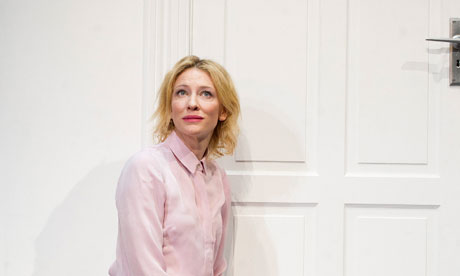
The good news, for fans of genuine deserve-it A-list celebrities or (more importantly) simply good acting, is that Cate Blanchett is beyond terrific. Whimperingly, blisteringly terrific. She is a revelation, and those cynics who at times sniff at Hollywood stars bringing themselves into London's theatreland to hone their "real acting" kudos should sit down in front of this show, for the full three hours; and they would then stand and applaud.
The bad news is that you would have to do that, just to see this tour de force from Ms Blanchett: sit in front of it, for three hours. It is not a bad play. What it is, most definitely, is a surreal, plot-free play written in Germany in the late 1970s, exploring alienation, post-war Teutonic guilt and mid-cold war existential angst over the environment, individuality and the discreet lack of charm of the bourgeoise, given a new English translation by an expert in Ionesco's (remember him?) theatre of the absurd. I realise I am perhaps not selling it too well.
Actually, the Sydney Theatre Company's production of Big and Small (Gross und Klein), from the acclaimed original by Botho Strauss, is much better than the above paragraph sounds.
It haunts, and much of it delights. The minimalist atmosphere, and music, and intensely clever set design – particularly in one strong middle sequence, when poor Cate, as Lotte, is frantically ringing doorbells at the foot of a high-rise (wheeled on stage in the darkness, high as the rafters yet only two-and-a-half feet wide – the stuff of dreams, and not good ones) don't intrude, but they certainly linger long. As do all the ensemble performances by a frantically good Aussie cast.
But it is well-nigh impossible to tear one's eyes from Cate Blanchett, right from the opener, as she sits, smoking, on stage, gazing at us, soliloquising at us. Fine, much of it is admittedly mad absurdist German 70s playwright soliloquising – yet she delivers it with such confidence and humour, her breaths swooping and dying but every single pointed, angry or delighted line being nailed just-so, that from here on in you actually forgive much of the play and simply marvel at being in the presence of a bona fide stage star.
I shan't try to explain too much of the plot, as much as it exists, because that would be as hard for me to attempt as it would be for you to understand. Suffice to say that Cate's Lotte, rejected by her husband, ends up being rejected in turn by just about everyone else she turns to for solace, or even company, or even human empathy. She is, always, emotionally far too open, too honest, too direct, too funny, too desperate. The playwright loathed the bourgeoisie, and this comes across in excoriating fashion.
We all, all of us bourgeoisie – in this way the play is relatively ageless, it becoming quite possible to ignore the overtones of the year of its writing and acknowledge a simple human condition – know someone like that: simply too keen, too honest, too frankly bloody needy, too easily hurt, and simply not fitting in.
At one stage her brother, an avowed pessimist, wonders why he's not more popular; slowly you realise that the eternal optimist can be equally unpopular, neither of them fitting neatly enough between our societal tramlines. So Lotte dances, she dances madly and she dances beautifully, and she flirts and she coos and she laughs and, oh so seldom but so necessarily, this fine production catches Blanchett's not imperfect golden face in seconds of sublime misery. Not least at the end, when she attends a doctor's waiting room only to watch each of the other expectant patients called before her, leaving with soft glances backwards: it turns out she had no appointment anyway, but was there simply for some company.
It's not just the pitch-perfect range of Blanchett's emotions that captivates; her balletic athleticism mesmerises throughout. She skips, she sprawls, she teeters and pirouettes and manages to imbue a simple walk across the stage with, depending on mood, exuberant gaucheness or filigreed elegance.
At the very end, even her slouching exhaustion by life has an energy to it. There were four ovations from the audience, which I think we can safely wager is the first time for a while that London audience has felt that way about lengthy German surrealist drama. And they weren't, trust me, applauding a Hollywood star. They were applauding the realisation that sometimes, just sometimes, a person truly deserves to be a star.
Big And Small (Gross und Klein) plays at the Barbican, London, until 29 April

